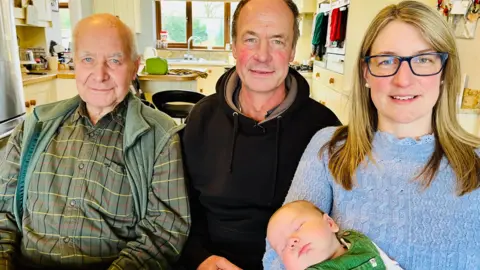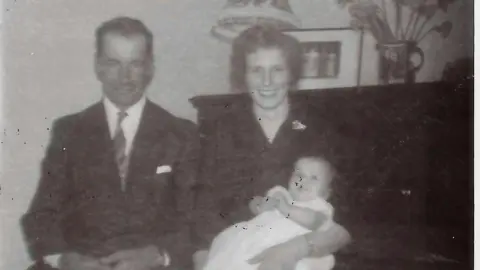'There could be no farm for my great-grandson'
 BBC
BBCA 91-year-old farmer fears there may be nothing left for his great-grandson if his family have to sell their land to pay inheritance tax (IHT).
Bob Armstrong split his Lincolnshire farm decades ago for his two sons, but tax changes announced in 2024 mean they face a combined IHT bill of £1.4m as he remains a silent shareholder in both.
Bob said his "final wish" was for a fourth generation of his family, eight-week-old Archie, to carry on what he started more than 65 years ago.
The government insists that changing IHT rules for farmers is a "fair and balanced approach, which fixes the public services we all rely on".
One of Bob's sons, David, 63, grows potatoes for Tesco and McCoy's on half of what was the original farm. On the other half, Jimmy, 61, grows crops for use in bread and breakfast cereals.
The grandfather-of-12 said his sons had been advised they each faced £700,000 tax bills when he and his wife, Margaret, die.
Bob said his wife "would be very upset" if she knew about the situation, but she was in a care home and unaware of it.
The couple, who have been married for 67 years, did not inherit the farm in Bardney, near Lincoln. Newly married, they moved from Scotland in 1957 to rent affordable land.
Bob said that through "hard work and long hours" they had managed to buy the land, and they developed the farm into what it is today.
Through tears, he said: "I started it off with 20 cows and enough money to get me round to the first milk cheque."
He added: "It upsets me. I have worked all these years to get it where it is. The long hours and nights we have spent between the wife and I calving cows... it takes the achievement away."
 Armstrong family
Armstrong familyDavid described the situation as "soul destroying", and said it would lead to a reduction in UK-grown food.
He told the BBC he had recently decided not to invest in a new project to produce more potatoes.
From April 2026, inherited farms worth more than £1m will be liable to be taxed at 20% – half the standard IHT rate. They were previously exempt from the tax.
The government says it wants to discourage the rich from buying land solely to dodge tax.
The prime minister previously told the BBC he understood farmers' concerns and "wants to support" them, and "the vast majority" of them would be unaffected by the change to the tax rule.
The government said the payments "can be spread over 10 years, interest-free".
David's daughter Kate, who is Archie's mum, hopes to take over the farm in the future.
She said: "It's not that we don't pay tax. We pay our fair share of tax as a business.
"We pay a good chunk of corporation tax. The biggest problem is that there is a lot of value within land and the assets of machinery, but the value of that land is only that value if it is sold.
"The ability to earn money from that land is quite disproportionate to the value of that land."
Listen to highlights from Lincolnshire on BBC Sounds, watch the latest episode of Look North or tell us about a story you think we should be covering here.
